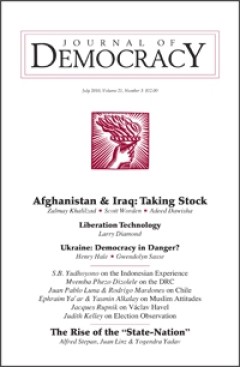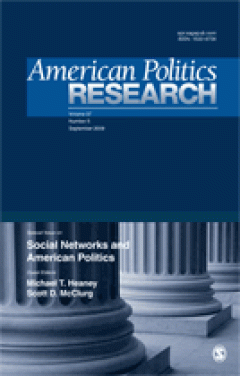Filter by

The Rise of “State-Nations”
Must every state be a nation and every nation a state? Or should we look instead to the example of countries such as India, where one state holds together a congeries of �national� groups and cultures in a single and wisely conceived federal republic?
- Edition
- Vol. 20, No. 3, July 2010, pp. 50-68
- ISBN/ISSN
- 10455736
- Collation
- -
- Series Title
- Journal of Democracy
- Call Number
- -

Liberation Technology
The Internet, mobile phones, and other forms of �liberation technology� enable citizens to express opinions, mobilize protests, and expand the horizons of freedom. Autocratic governments are also learning to master these technologies, however. Ultimately, the contest between democrats and autocrats will depend not just technology, but on political organization and strategy.
- Edition
- Vol. 20, No. 3, July 2010, pp. 69-83
- ISBN/ISSN
- 10455736
- Collation
- -
- Series Title
- Journal of Democracy
- Call Number
- -

The Role of Regionalism
Although Ukraine�s regional divisions are often thought to be detrimental to state-building and democratization, they have in fact been a source of strength and helped to prevent tilts to the political extremes.
- Edition
- Vol. 20, No 3, July 2010, pp. 99-106
- ISBN/ISSN
- 10455736
- Collation
- -
- Series Title
- Journal of Democracy
- Call Number
- -

Chile: Are the Parties Over?
For the first time since the fall of Pinochet, the Chilean right has come to power via free elections. The long-ruling center-left coalition leaves behind many achievements, but also disturbing signs of a weakened party system.
- Edition
- Vol. 20, No 3, July 2010, pp. 107-121
- ISBN/ISSN
- 10455736
- Collation
- -
- Series Title
- Journal of Democracy
- Call Number
- -

Political Attitudes in the Muslim World
A new look at the World Values Survey data reveals how the Muslim world�s religious context affects individual Muslims attitudes toward democracy.
- Edition
- Vol. 20, No. 3, July 2010, pp. 122-135
- ISBN/ISSN
- 10455736
- Collation
- -
- Series Title
- Journal of Democracy
- Call Number
- -

In praise of Vaclav Havel
A Tribute to Haclav Havel, Chech playwright and former dissident, who became not only president but the symbol of the �velvet revolutions.�
- Edition
- Vol. 20, No. 3, July 2010, pp. 135-142
- ISBN/ISSN
- 10455736
- Collation
- -
- Series Title
- Journal of Democracy
- Call Number
- -

The Mirage of Democracy in the DRC
Despite its historic 2006 elections, the Democratic Republicof Chongo still lacks competent governance, leaving its democratic promise unfulfilled.
- Edition
- Vol. 20, No. 3, July 2010, pp. 143-157
- ISBN/ISSN
- 10455736
- Collation
- -
- Series Title
- Journal of Democracy
- Call Number
- -

Election Observers and Their Biases
Why do election monitors sometimes issue contradictory statements or endorse flawed elections? The answers are not always straightforward: in some case, the monitors good intentions may undermine their credibility.
- Edition
- Vol. 20, No. 3, July 2010, pp. 158-172
- ISBN/ISSN
- 10455736
- Collation
- -
- Series Title
- Journal of Democracy
- Call Number
- -

Committee Parallelism and Bicameral Agenda Coordination
We examine why a significant proportion of the policy issues passed in either the U.S. House or Senate often fail to pass in the other chamber. We hypothesize that much of this failure of the House and Senate to coordinate their agendas occurs because committee jurisdictions are not parallel across chambers. To compare House and Senate agendas, we develop a comprehensive issue-level data set co…
- Edition
- Vol. 38 no. 1, January 2010, pp. 3-32
- ISBN/ISSN
- 1532673x
- Collation
- -
- Series Title
- American Politics Research
- Call Number
- -

Cooperative Party Factions in American Politics
What are the primary factions within the Democratic and Republican parties, and to what extent do rival factions cooperate? We address these questions using a unique data set of information sharing between party organizations, media outlets, 527s, and interest groups. Using social network methods, we identify two major information-sharing clusters, or expanded party networks; these networks cor…
- Edition
- Vol. 38 no. 1, January 2010. pp. 33-53
- ISBN/ISSN
- 1532673x
- Collation
- -
- Series Title
- American Politics Research
- Call Number
- -

Comparing Negative and Positive Campaign Messages: Evidence From Two Field Ex…
Considerable research indicates that personal contact from political campaigns can mobilize people to vote, but little attention has been given to whether the tone of the message matters. Studies of message tone have mostly been confined to mass media campaigns and ignored the growing role grassroots techniques play in contemporary political campaigns. Two randomized field experiments were cond…
- Edition
- Vol. 38 no. 1, January 2010. pp. 54-83
- ISBN/ISSN
- 1532673x
- Collation
- -
- Series Title
- American Politics Research
- Call Number
- -

Racing Toward Representation: A Hurdle Model of Latino Incorporation
Despite 35 years of empirical research, the question of how electoral structure influences Latino representation continues to be debated. Motivated by the uncertainty surrounding electoral systems, in this article, I argue that the inconsistent and inconclusive results of previous research stem from two limitations�one theoretical and the other methodological�of commonly used models. In the fol…
- Edition
- Vol. 38 no. 1, January 2010. pp. 84-109
- ISBN/ISSN
- 1532673x
- Collation
- -
- Series Title
- American Politics Research
- Call Number
- -

Assessing the Causes and Effects of Political Trust Among U.S. Latinos
This article examines why Latinos are more trusting of the federal government than Anglos and Blacks. We address this puzzle by turning to previous research on racial politics and political trust. Consistent with previous research, discrimination and generational status are important predictors of Latinos� political trust, with first-generation Latinos more trusting than later-generation Latino…
- Edition
- Vol. 38 no. 1, January 2010. pp. 110-141
- ISBN/ISSN
- 1532673x
- Collation
- -
- Series Title
- American Politics Research
- Call Number
- -

Do Candidate Positions Matter? The Effect of the Gay Marriage Question on Gub…
This article demonstrates that candidate positions on the ballot measure to ban gay marriage had an effect on gubernatorial voting. With exit poll data from three states in 2006, we find that the effect of support for the ban is at least twice as large when the candidates adopted divergent positions. Support for the ban has a smaller but significant effect on vote choice when the candidate posi…
- Edition
- Vol. 38 no. 1, January 2010. pp. 142-164
- ISBN/ISSN
- 1532673x
- Collation
- -
- Series Title
- American Politics Research
- Call Number
- -

A Matter of Distinction: Candidate Polarization and Information Processing in…
Because Republican and Democratic elites have polarized in recent decades, American voters increasingly face choices between candidates who hold divergent policy positions. Such a development has potential implications for the way voters process information during campaigns and choose between candidates on election day. Drawing on research in political psychology and using a nationally represen…
- Edition
- Vol. 38 no. 1, January 2010. pp. 165-192
- ISBN/ISSN
- 1532673x
- Collation
- -
- Series Title
- American Politics Research
- Call Number
- -

Voter Ideology and Candidate Positioning in the 2008 Presidential Election
Although classic Downsian theory predicts that candidates should converge to the ideological position of the median voter in the electorate, American elections generally feature major party candidates who offer divergent policy positions. Employing a survey and statistical estimation technique that allows for the estimation of the ideological position of candidates on the same scale as the dist…
- Edition
- Vol. 38 no. 2, March 2010, pp. 195-210
- ISBN/ISSN
- 1532673x
- Collation
- -
- Series Title
- American Politics Research
- Call Number
- -

Voter Mobilization and the Obama Victory
As with the other presidential elections from this decade, the 2008 election was followed by considerable speculation as to how new efforts to mobilize voters affected the eventual outcome. Although the conventional wisdom implies that �Democrats benefit from higher turnout,� previous research in political science demonstrates that such a conclusion applies to actual election results inconsiste…
- Edition
- Vol. 38 no. 2, March 2010. pp. 211-232
- ISBN/ISSN
- 1532673x
- Collation
- -
- Series Title
- American Politics Research
- Call Number
- -

Revisiting the Divisive Primary Hypothesis: 2008 and the Clinton—Obama Nomi…
The 2008 Democratic primary was marked by divisiveness as notable as its historic candidates. And while Barack Obama won the general election,political scientists would be remiss in studying divisive primary effects only when they are electorally decisive. Accordingly, we examine this largely forgotten storyline, searching for these effects throughout different segments of the electorate. Our a…
- Edition
- Vol. 38 no. 2, March 2010. pp 233-265
- ISBN/ISSN
- 1532673x
- Collation
- -
- Series Title
- American Politics Research
- Call Number
- -

What Made Carolina Blue? In-Migration and the 2008 North Carolina Presidentia…
In this article, we examine the role that in-migration played in contributing to the 2008 Democratic presidential victory in North Carolina. Prior to Barack Obama, the last time the Tar Heel State was carried by a Democrat was Jimmy Carter in 1976. Since the late 1980s, North Carolina has undergone tremendous demographic change. In addition to a growing Hispanic population that is primarily com…
- Edition
- Vol. 38 no. 2, March 2010, pp. 266-302
- ISBN/ISSN
- 1532673x
- Collation
- -
- Series Title
- American Politics Research
- Call Number
- -

Political Advertising and Persuasion in the 2004 and 2008 Presidential Elections
The 2008 presidential election was historic in many respects. The campaign included the first African American major-party candidate, and neither candidate was an incumbent president or vice president. In addition, one candidate took public funding and the other candidate did not. This latter disparity resulted in an imbalance of resources across the two campaigns, especially in the purchase of…
- Edition
- Vol. 38 no. 2, March 2010. pp. 303-329
- ISBN/ISSN
- 1532673x
- Collation
- -
- Series Title
- American Politics Research
- Call Number
- -
 Computer Science, Information & General Works
Computer Science, Information & General Works  Philosophy & Psychology
Philosophy & Psychology  Religion
Religion  Social Sciences
Social Sciences  Language
Language  Pure Science
Pure Science  Applied Sciences
Applied Sciences  Art & Recreation
Art & Recreation  Literature
Literature  History & Geography
History & Geography